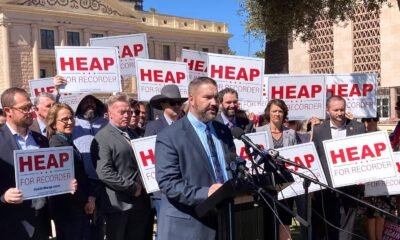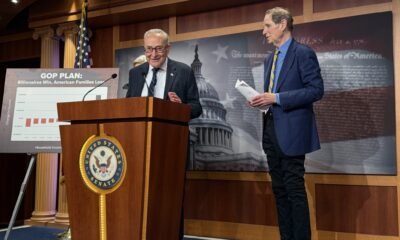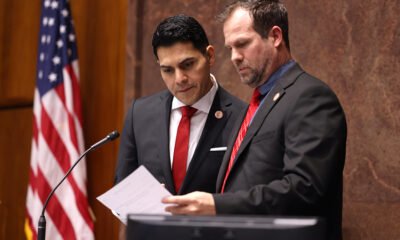border
U.S. House GOP Kicks Off Budget Reconciliation with Boost for Border Security

U.S. House Republicans have commenced efforts to develop a comprehensive funding bill focused on President Donald Trump’s key initiatives. This legislation emphasizes a significant increase in funding for immigration enforcement and border security.
Upon returning from a two-week recess, lawmakers engaged in debate and amendments within various committee sessions, including Armed Services, Education and Workforce, and Homeland Security.
Utilizing a special reconciliation process, designed to bypass the Senate’s 60-vote filibuster, congressional Republicans aim to consolidate their priorities, which encompass border security, tax cuts, energy policy, and defense funding.
The proposed bill by the Homeland Security Committee seeks to augment border security funding by $70 billion,reflecting Trump’s second-term vision focused on stricter immigration measures.
Details include allocating $46.5 billion for border barrier construction and $5 billion for Customs and Border Protection facilities. This plan also proposes hiring 3,000 Border Patrol agents and 5,000 CBP officers, alongside $2 billion earmarked for staff retention bonuses.
“It is essential for the Republican majority to fulfill our commitment to effective border security,” stated House Homeland Security Chairman Mark Green from Tennessee.
The bill also proposes $2.7 billion for technology surveillance along the borders and approximately $1 billion for inspection technology at ports of entry.
Democrats, however, have voiced strong opposition. Rep. Bennie Thompson from Mississippi contended that the proposed funding would enable the administration’s mass deportation plans instead of genuinely enhancing border security.
“House Republican leadership is misrepresenting the reconciliation package by framing it as border security,” Thompson criticized.
Votes on the committee bills and Democratic amendments are anticipated to occur late Tuesday or early Wednesday, with little expectation that any amendments will be adopted.
Speaker Mike Johnson of Louisiana indicated that the House will continue discussions over the next week on the 11 individual bills before combining them into one reconciliation package. A full House debate and vote are targeted for completion before Memorial Day.
Johnson expressed optimism about Senate collaboration, noting that Senate Republicans have been working cohesively on this initiative.
Treasury Secretary Scott Bessent has indicated a desire for the package to progress through Congress ahead of the Fourth of July, and Johnson hopes to meet this timeline.
Thune reinforced that the final content of the reconciliation package will be shaped by available votes in both chambers.
Democrats have introduced amendments aimed at signaling their dissent regarding deportations. Louisiana Rep. Troy Carter raised concerns over the recent deportation of U.S. citizen children, focusing on the trauma it inflicted.
“This is not about border security. This is state-sanctioned trauma,” Carter stated.
Various amendments have been proposed to prevent federal funds from being allocated toward detaining immigrants in foreign prisons, raising serious human rights concerns.
The House Armed Services Committee’s reconciliation portion proposes a $150 billion defense spending increase over the next decade, emphasizing national security investments.
Among the priorities, $25 billion is earmarked for developing a missile defense system akin to Israel’s Iron Dome.
Chairman Mike Rogers remarked on the intended generational investment, stressing the urgency posed by evolving threats from adversarial nations.
Democratic Rep. Adam Smith acknowledged the necessity for defense funding but criticized the Republicans for potentially exacerbating national debt without sufficient accountability.
On the education front, the Education and Workforce Committee reported similarly partisan divides. Republican Chairman Tim Walberg emphasized the need for reform to reduce federal spending by $330 billion over the next decade.
Walberg argued that more funding does not necessarily yield effective outcomes in education, criticizing the previous administrations for not addressing systemic inefficiencies.
In response, Virginia Democratic Rep. Bobby Scott asserted that the GOP bill would potentially increase costs for students, limit access to essential programs, and ultimately affect students’ career trajectories.
“This plan will disproportionately harm middle- and low-income students by restricting their access to vital federal assistance,” Scott warned. “The consequences could lead students to resort to predatory loans.”


















